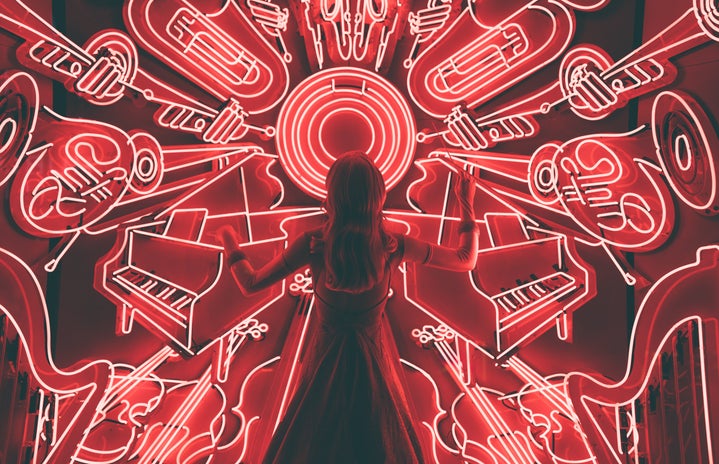Being raised by a single dad, there weren’t a lot of feminine figures around. I quickly associated anything “girly” with the superficial. Madonna seemed to be the epitome of that shallow, material girl that I resented. It’s sort of like that stage when you hate the color pink: Hello internalized misogyny! Now I look back and realize how innovative Madonna was in creating her own sense of sexual empowerment.
She pushed societal boundaries, but some say she pushed them too far: people still debate if her explicitness is empowering, or degrading. There seemed to be a trend in the 1970s where women who expressed their sexuality were labeled as sell-outs, like Cherie Currie in The Runaways. This essentially minimizes their success by equating a woman’s body to mere market value — it’s problematic, to say the least. A woman shouldn’t be shamed for her sexuality. A woman’s body is not an object. Period. So, in spite of these popular opinions and some censorship quarrels, Madonna became a cultural icon and paved the way for women in music, while encouraging them not to be afraid of their bodies or sexualities. Honestly, I feel bad for doubting her when I was a kid. So here’s a recap of some of her greatest hits:
Like a Virgin
Released in 1984, this cover was a commercial success. It was the first female album to sell over 5 million copies in the United States and still remains one of the best-selling albums across the world. In her music video, Madonna sports a lace bustier and crosses, while celebrating how new relationships or sex can make you feel fresh and pure, like a virgin. She’s provocative in the way she mocks the church for shaming girls and women for premarital sex. Her name “Madonna” is the Catholic title for Jesus’ mother Mary, and links this song with the virgin birth. Her use of irony alongside her sex-positive beliefs is captivating and personally freeing.
Check out the music video here: https://www.youtube.com/watch?v=s__rX_WL100
Vogue
This song is known as one of Madonna’s greatest hits and the music video is critically acclaimed. Though there is some controversy with how she profited from depicting the Harlem ball scene, she propelled queer culture into pop, similar to Lady Gaga. To me, this track is all about how intoxicating beauty standards are, but also how crucial self-expression is. But, when the music video was released, MTV wanted to remove the scene where Madonna’s breasts can be seen through lace––Madonna refused, and the scene was aired. She stood up for her work and how she chose to express herself, and she won. Some might say this is objectifying, pornographic, or just vulgar, but I see it as empowering. Girls are taught from day one to cover up, to be ashamed of their bodies, but Madonna challenges this by standing up to censorship.
Check out the music video here: https://www.youtube.com/watch?v=GuJQSAiODqI
MTV video here: https://www.youtube.com/watch?v=lTaXtWWR16A&t=137s
Material Girl
Even though I hated this track when I was younger, it’s my favorite song from Madonna now. Yeah, she comes off as shallow, but really she’s self-aware and cunning. She’s working with the system that’s given to her and she’s owning it. But on a satirical level, she’s only playing the materialistic role as a pop-singer, and really only wants something genuine or something as simple as flowers (as the video shows.) Personally, I love how provocative she is and how she plays with irony. It makes sense that this was her third top-five single in the Billboard top 100.
Check out the music video here: https://www.youtube.com/watch?v=6p-lDYPR2P8
As a kid, I hated her. But as an adult, I realize how inspiring and open-minded Madonna really is. In her music videos, she expresses herself through her fashion and body, challenging religious and societal expectations of a woman’s sexuality. Some might argue she’s only profiting from the male gaze, but personally, I see her as a feminist icon who rejects the idea that our sexualities should be hidden or shamed.

